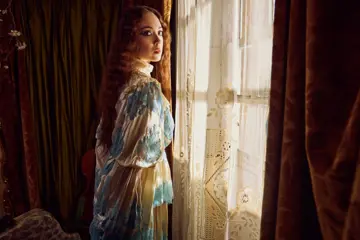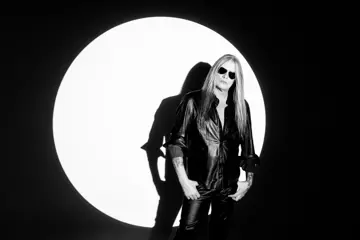When Maarja Nuut was four - or, so her parents tell it - she saw a violin on TV, pointed at it, and said: “I want, too.” Growing up in Rakvere, a small, snowy town in Northern Estonia, her mother a choir conductor and music teacher, young Maarja started studying violin at seven, and - aside from a brief obsession with Egyptian archaeology as an eight-year-old - always had music at the centre of her life. At 12 she went off to boarding school, at a Tallinn music college. From there, she went to the Estonian Academy Of Music And Theatre, working towards being a professional classical musician.
But that whole experience was often hard, and rarely joyful. “I always had a really complicated relationship to playing violin, studying music, doing this as a profession. I loved it, but I hated it,” says Nuut. At the Academy, Nuut says, she “overplayed her hand”, starting to suffer from RSI. So, she took a radical step to continuing her musical studies: taking a year abroad in Delhi, studying Hindustani music.
“It was certainly life-changing,” Nuut offers, in hindsight. “That’s a big word, but it was. I was going away to such a different place, alone. And, then, I had wonderful teachers there, the best that I could dream of. I really spent months playing two scales. In Indian music, you have the ragas, and it’s really just the repetition of these two scales. I would just play one note for an hour, really exploring how many different ways I could intonate, articulate, play and perceive this same note. I learnt how to find silence in me, how to be still and focus in the middle of this crazy, colourful city of New Delhi. That’s where I learnt to really listen to a sound. That’s where I learnt that [music] was a part of me, that it was something I really wanted to express. I was 21, and I’d been playing music all my life, but that was the moment where it really felt like it was mine.”
But, Nuut is at pains to point out that her time in India “wasn’t like a moment of enlightenment” (“we are pretty slow and introverted people, we Estonians, that’s not something we’d experience”). Instead, it was both something that changed how she thought about music (“I just needed to learn to find the connection between a musical idea in my head, and that I’m able, physically, to express it on my instrument”), and changed what she wanted to do in music.
Don't miss a beat with our FREE daily newsletter
Upon returning to Estonia, she dropped out of her classical studies and began studying Estonian folk music. At the Viljandi Culture Academy in Tartu, on a university campus built in the 17th century, she found a cache of archival recordings of Estonian traditional music, made in the 1920s and ’30s, treasures from a time before Soviet occupation. “My ears were so sharp, coming from India, so, that whole soundworld just sounded so captivating and weird and psychedelic,” Nuut offers. “I became obsessed with [it]. If you get into something like this, 24/7, for four years, you’re soaked through with that sound. The reason I was so into it, that I so connected to it, is that you have these small, minimal patterns that repeat and repeat and repeat. But, at the same time, you variate with these little details, these microtones, these weird scales. You’re trying to get maximal out of minimal.”
This proved hugely influential on Nuut’s music. Her first solo album, 2013’s duly-titled Soolo, found her creating hypnotic, repetitious patterns out of live-looped violin and voice. Her second record, 2016’s Une Meeles, applied the same tools to compositions closer to traditional songform. In 2018, she collaborated with the Estonian musician Ruum on Muunduja, an LP exploring intersections of folk and electronic music, again centred around repetition.
“It’s pretty suggestive, hypnotic; that comes with repeating the phrases over and over again, getting into a certain transcendent state of mind,” Nuut offers of her collaboration with Ruum. “It’s hard to talk about these things because it’s something that you feel. Maybe the closest comparison could be with meditation. People who don’t do music but meditate, maybe they know the feeling we are searching for, touch on a similar kind of state.”















